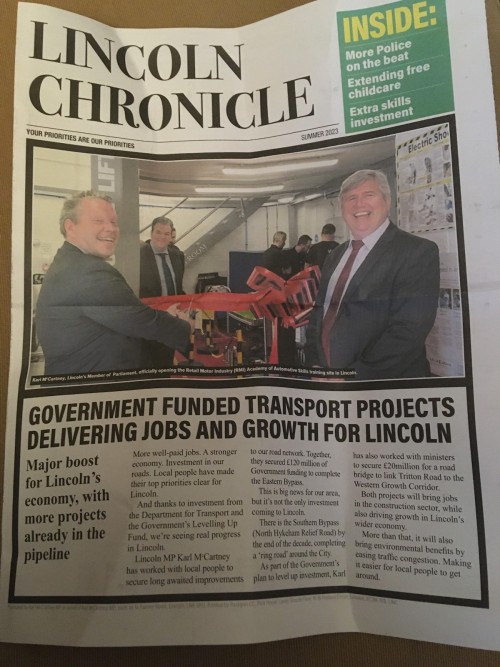The UK Government has said fake local newspapers “should not be regulated” after refusing to act on MPs’ use of the practice.
The Government has told HTFP it believes local press mimicry by MPs and political parties is part of the country’s “tradition of robust political debate and freedom of speech”.
Whitehall’s refusal to act against the practice comes after dozens of Tory MPs began delivering such pamphlets in recent days.
Among them were the names of two real former local newspapers – the Lincoln Chronicle and the High Peak Reporter.

The fake Lincoln Chronicle, issued by Tory MP Karl McCartney
Quest Media Network, which owns the intellectual property rights to the Reporter’s name, subsequently demanded a public apology and charity donation from the Conservative Party over the issue.
The Electoral Commission last week claimed it was “powerless” to stop politicians from mimicking local papers on the grounds that there is “nothing in law to control the style and presentation of campaign material”.
HTFP approached the Cabinet Office, which is listed on the Government’s website as the department responsible for elections, to ask whether it is planning to take any action to prevent the practice from being employed in future by MPs and political parties.
Our enquiry was subsequently passed on to the Department for Levelling Up, Housing and Communities.
In response, a Government spokesperson said: “The Government is committed to supporting local and regional newspapers as vital pillars of communities and local democracy.
“They play an essential role in holding power to account, keeping the public informed of local issues and providing reliable, high-quality information.
“We have a tradition of robust political debate and freedom of speech in our democracy.
“Policy or political arguments which can be rebutted by rival campaigners or the press as part of the normal course of political debate should not be regulated.”
A poll for Byline Times by independent pollsters Omnisis has also revealed 62pc of voters think the practice should be banned if they do not make clear which party is behind it.
The figure rises to 65pc among Conservative voters, the same as for Labour voters, while 55pc of Liberal Democract voters agree with a ban.
HTFP has repeatedly highlighted different parties’ use of the tactic in recent years, while the issue prompted Newsquest editorial director Toby Granville to threaten not to publish Liberal Democrat election campaign news ahead of the 2019 General Election.
The Commission subsequently revealed the practice was among the major concerns of the public in its report into campaigning ahead of the election and called for “real change” on the issue.

 Follow HTFP on Twitter
Follow HTFP on Twitter